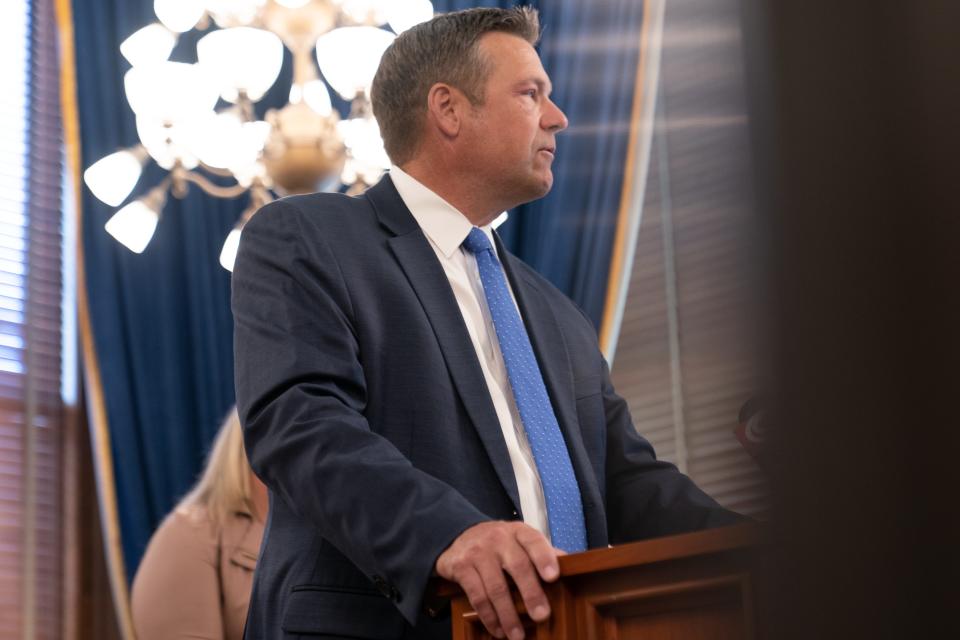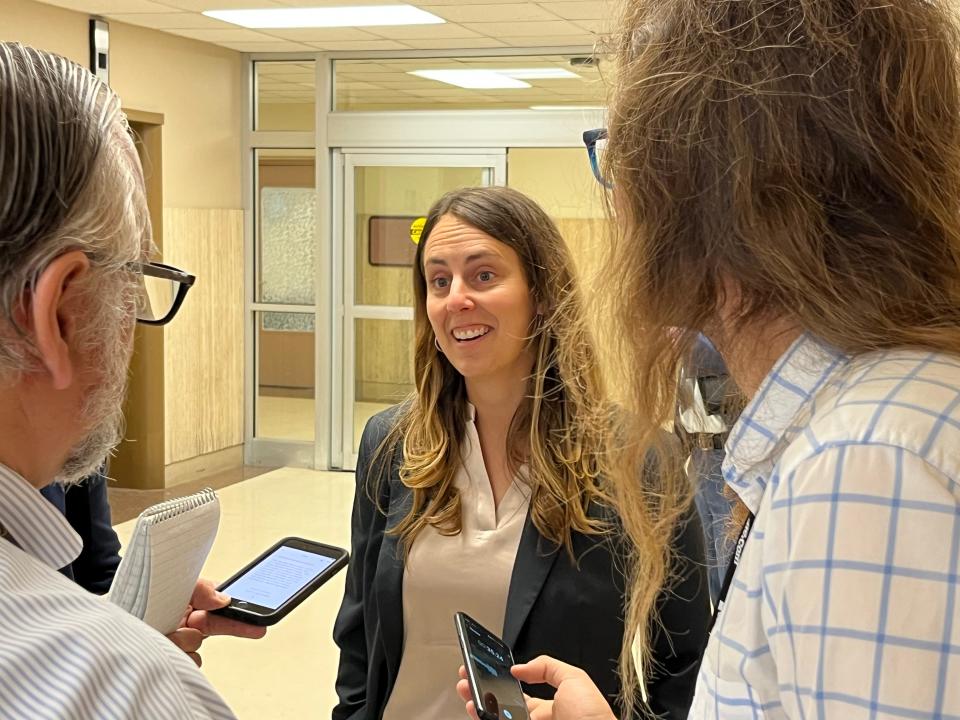Will transgender Kansans be able to change gender markers? Kris Kobach and ACLU square off
- Oops!Something went wrong.Please try again later.
Six months after a judge blocked transgender Kansans from changing the gender marker on their driver's licenses, the issue is back in Shawnee County District Court for a longer-lasting order.
Republican Attorney General Kris Kobach has taken Democratic Gov. Laura Kelly's administration to court, suing Kansas Department of Revenue officials over their decade-old gender marker policy.
The Revenue Department has not changed any gender markers since July 10 due to a temporary restraining order that Judge Teresa Watson issued based solely on Kobach's filings. That order was later extended until the court could hear arguments on Kobach's motion for a temporary injunction, which started Wednesday and were expected to last into Thursday.
Kobach's case relies heavily on alleged "reasonable probability" of injury to law enforcement. Both the Revenue Department and the intervenors represented by the ACLU argue there is no evidence of actual harm to public safety and the vague wording of SB 180 does not supersede the state's specific statutes on driver's licenses.
He also argued for uniformity in state documents.
"The objective of SB 180 is to stop things from changing from agency to agency and gubernatorial administration to administration," Kobach said.

Kansas has changed more than 500 gender markers since 2011
Since 2011, Kansas Department of Revenue policy had allowed gender marker changes on driver's licenses. That stopped after the July 10 temporary restraining order.
Kent Selk, the Revenue Department's driver services manager, testified that KDOR has been complying with the order. But "it was rather difficult" at first.
The agency received complaints against examiners, Selk said, especially from people who had gotten letters before July 10 approving requests to change gender markers but had not yet completed the process of getting new credentials before Watson blocked their issuance.
Before the order, the state had approved 552 gender marker changes since 2011. Gender and sex are generally used interchangeably for driver's license purposes, as SB 180 uses "sex," the driver's license statute uses "gender," the physical ID card says "sex" and national standardization for driver's licenses use "sex."
Under both the 2011 policy and a 2019 update, transgender Kansans needed a letter from a physician to get the gender marker changed.
"They cannot simply go into the driver's license office and have it changed," Selk said, noting similarities to required documentation to change a name or address.
Selk said the Revenue Department does not consider driver's license data to be vital statistics and said the purpose of a license his not historical information.
"The primary role is to give accurate information of the individual" with the most current information available, Selk said.
If the attorney general is successful, Selk said, the Revenue Department will be bound by the original Kansas birth certificate. But that could create inconsistencies, as the agency could not control potential gender changes on birth certificates or on U.S. passports. Most states allow gender marker changes on official documents, he said.
Such complexities could be present with two of the intervenors who testified Thursday, as one was born in Illinois and the other in Ohio.
When SB 180 originally went through the Legislature, it was not viewed as affecting driver's licenses.
Selk said he is typically in communication with legislators on transportation, judiciary and budget committees about matters involving driver's license, but no one on the health committees ever reached out about how SB 180.
"The very broad statute, it doesn't override a very specific statute ... that was drafted for a very specific issue to facilitate (issuing driver's licenses)," said Revenue Department general counsel Ted Smith.
Kobach argued there is no ambiguity in SB 180 and its application to driver's licenses.
ACLU tried early move to stop attorney general injunction
Kobach's team rested its case by midafternoon, and the ACLU immediately made a procedural move to ask the judge to dismiss the attorney general's request for a temporary injunction. Brett argued that Kobach had not met his burden of proof in showing harm to law enforcement and the general public.
"They hypothetical problems with law enforcement is just that, it's hypothetical," said Sharon Brett, the ACLU of Kansas legal director.
Kobach disagreed, also arguing that there is injury from state government disobeying its own laws.
Watson denied the requested directed verdict.
"I believe there is enough at this time," she said, to support the alleged injury to the state.
If order remains in place, what happens to driver's licenses of transgender Kansans?

Transgender Kansans Adam Kellogg and Kathryn Redman testified on Thursday after Watson denied Kobach's motion to block them from testifying.
Kellogg was born in Illinois and has an Illinois birth certificate, but now lives in Kansas and is a graduate student at the University of Kansas. He was assigned female at birth, but started publicly identifying as a male in seventh grade. The impetus was a middle school dance where his then-boyfriend asked him to wear a dress.
"As soon as I walked in those doors," Kellogg said, "I realized everyone saw me as a girl, and I didn't want that."
Social transitioning at age 12 was followed up by puberty blockers at age 13. Then came changing his legal name at age 14, starting with a court-ordered change to the Illinois birth certificate.
"It was so embarrassing and painful to hear my birth name," Kellogg said.
But his gender marker didn't change, so his learner's permit at 14 said "female."
At age 15, when applying to his first job at a Dairy Queen in Shawnee, he had to present a driver's license with a male name but female gender marker.
"I'm not so sure this is you," Kellogg recalled the interviewer saying. "This says female on it."
Kellogg then felt he had to disclose is transgender status, in a public setting.
"It is a terrible reminder that in the eyes of somebody, they don't see me as a man," he said. "It makes me feel less-than, like I am not a person."
He had similar experiences at pharmacies — like when he first picked up a prescription for testosterone.
That was for hormone replacement therapy, which started three days before his 17th birthday, which was followed the next year by top surgery — a double mastectomy. He described that as "a very freeing moment." Then came removal of the fallopian tubes.
He described gender dysphoria as "I experience a discord with the sex I was assigned at birth and how I identify and present myself."
The gender marker change came in August 2021, and he no longer had people question whether his ID was fraudulent. Now, he said, "I don't have to explain why I look the way I look — a beard, deep voice and broad frame."
But he is worried that may change, based on the current court order and Kobach's interpretation that SB 180 requires amended documents to be reverted to the original sex marking.
The issue is time sensitive for Kellogg, whose current license expires when he turns 21 on June 20.
'All I want to do is live the rest of my life at peace with myself'
Redman, who is 63 and a Lenexa resident, has a court order changing her gender because of a surgical procedure.
Because of her surgery and the strict definitions of sex in SB 180, Redman said she is "in no man's land because I can't produce sperm or ova."
She was identified as male at birth because "my mother's OB-GYN or some pediatrician took a look between my legs and assigned me male," but she knew at "a young age" that male did not feel right. Despite being diagnosed with gender dysphoria in around 1992, she did not come out or seek treatment until 2018.
She then had five affirmation surgeries in 2020 and 2021. But before the surgeries, while presenting herself as a woman in public, she faced challenges when flying, often for trips to New York for affirmation surgeries and consultations. She said the TSA subjected her multiple times to supplemental security screening, involving a pat down of her genital areas in public.
"I had been embarrassed in front of everybody out there in the middle," Redman said. "Everybody is staring at you."
Ever since getting her driver's license gender marker changed in August 2021, she has not been subjected to additional screening.
She said the first thing she did after getting the paper copy of her new license with a female gender marker, she texted her children and close friends a photo and told them "Hey I'm me finally."
Even after getting the surgeries but before getting the gender marker change, she had difficulties with insurance. While insurance covered her hormone therapy and surgeries, they initially denied the annual mammograms recommended by Redman's physicians. She had to appeal in 2019, 2020 and 2021 in order to get the preventive health care covered.
After the gender marker change, she did not have any difficulties with insurance covering mammograms in 2022 and 2023.
She does not want it to revert to male when her current license expires in 2027.
"I am happy," Redman said. "All I want to do is live the rest of my life at peace with myself."
Why does a sex or gender marker matter to law enforcement?
After rejecting the ACLU's motion to block certain law enforcement officers from testifying, Kobach elicited testimony from Shawnee County Sheriff Brian Hill and Johnson County Sheriff's Office Maj. Rick Newson.
Hill suggested that crime suspects may change their gender appearance in an attempt to avoid arrest.
While Newson is the Johnson County Sheriff's detention bureau commander, he said he doesn't have personal knowledge of how the current jail intake process works since he hasn't done that job in a decade
But he does know "the sheriff's office is liable for the safety of everyone who comes through that door," acknowledged federal law on preventing sexual assaults in prisons, said transgender and intersex inmates are housed on a case by case basis, and said that housing decisions are not based solely on driver's licenses."
Housing is based on "functioning genitalia," he said, admitting that he does not know how that standard compares to biological sex at birth.
Newson also said he found out that the sheriff's office had little useful information for the attorney general's office when assistant attorney general Jesse Burris first reached out.
The Revenue Department brought in to testify Kansas Highway Patrol Capt. Jim Oehm, commander of Troop M, which handles communications, data and records. But Watson limited his testimony, ruling he couldn't be used as an expert witness because his declaration was sent about a month late to the attorney general's office. The Revenue Department attributed the delay to getting KHP command staff to approve of the contents.
Oehm said he had no personal knowledge of any issues in the past decade due to the driver's license gender change policy, and that sex or gender are never used by themselves to identify someone.
Selk said he has never heard of any concerns from law enforcement or other agencies over the gender marker policy and the Revenue Department database.
He also said no such concerns have come from organ donation networks. Kobach had initially argued that gender marker changes could affect health because of organ donations.
Shawnee County Sheriff Brian Hill has arrested a transgender person
Hill said he has previously arrested a transgender individual who "was trying to do harm to a landlord; they were trying to stab them." The arrestee presented as male and Hill believed they were male, but was later told after the arrest that they were female. Once that was discovered, so was the subject's criminal history.
But Hill acknowledged that the confusion did not ultimately cause any significant problems.
He did not say when the incident occurred in his 32-year law enforcement career, or how the driver's license did or did not contribute to the confusion.
How were the transgender Kansans addressed?
When Kellogg first walked up to the stand to be sworn in, Watson referred to him as "sir." He later requested that lawyers refer to him as "Adam." They obliged.
Redman requested to be referred to as "Ms. Redman." The ACLU attorney obliged, but Kansas solicitor general Anthony Powell asked to call her "Kathryn" because "It would make me more comfortable to do that."
Kobach's has previously asked a federal circuit court to not require attorneys to use the preferred pronouns of counsel, litigants and witnesses during hearings. Pronouns were not used in Thursday's hearing.
No cameras or recording in the courtroom
The judge denied a request from The Topeka Capital-Journal for photography and audio recording of the proceedings, noting that two witnesses had been granted anonymity.
The attorney general's office objected to the continued anonymity of at least one of them because that person had attended a rally and their name appeared in a media report. The judge closed the court session to handle the matter, which was to be resolved at another closed hearing Thursday morning..
Two University of Kansas law professors filed an amicus brief, but Kobach objected to it, and Watson denied it as duplicative of arguments already before the court.
Watson also indicated she would not allow into the court record the YouTube livestreams of legislative committee hearing on SB 180. While the hearings could help establish legislative intent, the judge questioned whether they should be considered official records of the Kansas Legislature.
While Watsons said there have been more than 1,000 pages worth of documents filed in the case, relatively few of those are publicly available due to a backlog in uploading months worth of filings that occurred while the court records system was offline following a cyberattack.
More: 'Foreign cyberattack' stole data from courts in 'assault on the Kansas system of justice'

Construction interrupted hearing at times
The court hearing was briefly interrupted with intermittent sounds of construction. The courthouse is undergoing renovations.
"Normally it doesn't last very long," Watson said, before the apparent bangs of hammers and drilling of power tools made her inaudible. "Base on my long experience with this, it usually goes in short burst."
When the noise crescendoed, examination of witnesses paused until it diminished.
More: Here is how $14.48 million will be used for Shawnee County Courthouse renovations
What comes next?
The hearing is scheduled to resume Thursday and is expected to last into the afternoon, though it could ultimately go into Friday.
Thursday's hearing will have more testimony about the experiences of transgender Kansans, plus testimony from Beth Oller, a Rooks County doctor who has treated more than 100 transgender patients. But Watson limited her testimony, ruling that she does not qualify as an expert witness.
While the judge could issue a ruling immediately after closing arguments, it is expected that she will take more time to formulate and write out her opinion. At that point, whatever side loses will likely appeal to the Kansas Court of Appeals and ultimately to the Kansas Supreme Court.
Jason Alatidd is a Statehouse reporter for the Topeka Capital-Journal. He can be reached by email at jalatidd@gannett.com. Follow him on X @Jason_Alatidd.
This article originally appeared on Topeka Capital-Journal: Kansas is in court over gender marker changes on driver's licenses

